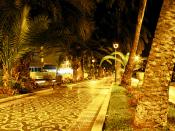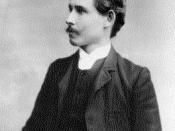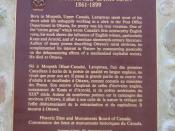Poet and philosopher Archibald Lampman (1861-1899)
led not a life of his own, but an existance forced upon him by peers and an
unfeeling and cold society. Dying far before his time, Lampman led a life
of misery. He was supported only by a few close friends and his immortal poetry.
This essay is founded around one particular of his works but I feel it
necessary to discuss the conditions in which he lived in order to fully
understand what he was trying to express and/or symbolize.
Lampman really hated his day to day life, he lived only for his friends and
his works. Trapped in a city for which he had no love, he often reflected
his loathing of it in his numerous works situated in cities. A lover of
nature, Lampmans poems often immediately assumed a tone of life, mirth,
and a feeling of pleasure and warmth; the others formed a picture of death,
hell, and hate all held together by the one problem that is always present,
Man.
With few close friends like Duncan Campell Scott, and other that were poetically
inclinded, Lampman formed a group through-out collage that met frequently
to write and discuss. Close friends like that influenced him to write such
popular pieces as 'Heat' and 'A sunset at Les Eboulements' and yet in his
darkest moments we get the main topic of this essay 'The City of The End of Things'.
Like most great poets, Lampmans moods and feelings had a direct effect on the
nature and topic of his poetry. Lampman chief poetry was done after a great
joy in his life, or a great sadness. Sadly, Archibald was not a rich man
and lived not a happy life, and most of his poetry reflects that.
'The City of The End of...


